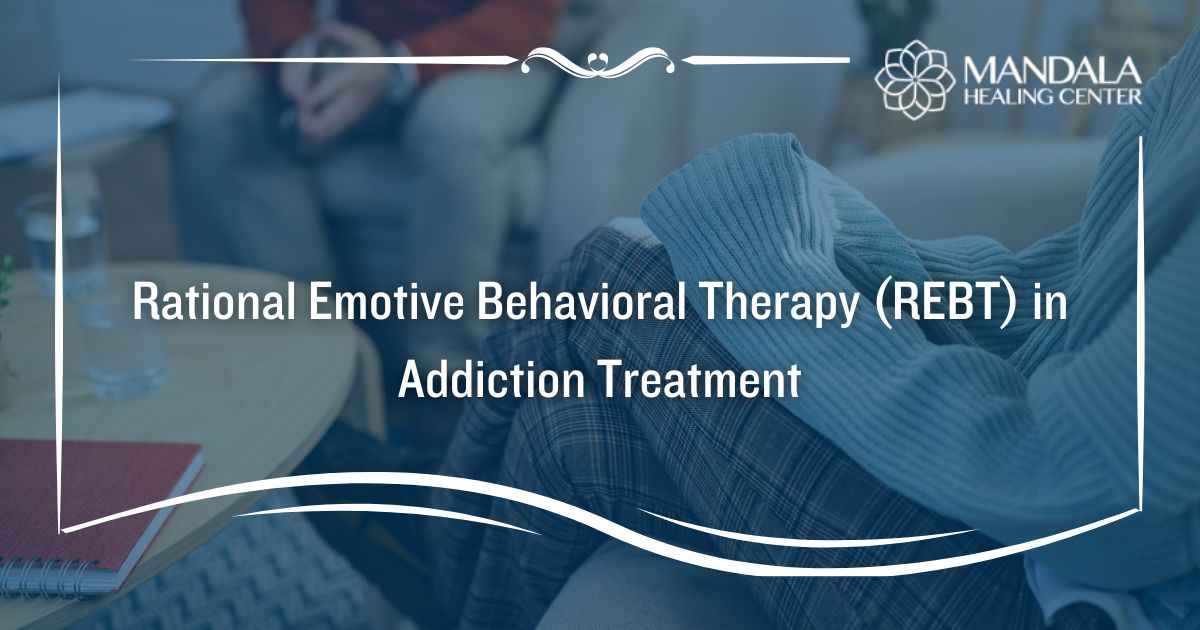Drug and alcohol addiction is a complex condition that affects more than just a person’s body. Genetics, behaviors, environment, mental and physical health history, and other factors can increase the likelihood that someone will develop substance abuse and addiction. These factors can also impact the recovery process.
Because addiction is a complex condition, people struggling with substance abuse require comprehensive treatment that addresses the multifaceted roots of this condition. There are many evidence-based treatments and therapies that can be used to help people recover from addiction and move forward.
Rational emotive behavioral therapy (REBT) is a type of psychotherapy that can be used during addiction treatment programs and recovery to help people understand and change destructive thoughts and feelings that can lead to substance misuse.
This article will explore rational emotive behavioral therapy, how it works, and how it can support meaningful addiction recovery. Reach out to the caring specialists at the Mandala Healing Center to learn more about REBT or any of our holistic treatment programs.
What is Rational Emotive Behavior Therapy (REBT)?
Rational emotive behavioral therapy, or REBT, is a form of talk therapy that aims to help people identify and change negative or irrational thoughts and feelings. The primary goal of REBT is to help people understand how feelings that arise from irrational beliefs can cause distress and lead to destructive behaviors, including substance misuse.
People work with a trained, licensed therapist to identify challenging emotions, such as:
- Depression
- Guilt
- Shame
- Anger
- Anxiety
The therapist and client work to deeply examine the events that came before these emotions and identify how these feelings drive behaviors.
Rational emotive behavioral therapy allows people to view past events with more emotional neutrality and respond to future events in a less emotionally reactive manner. The client learns to analyze thoughts and respond to events without reacting to their emotions, giving them more control over their behaviors.
Who May Benefit From Rational Emotive Behavioral Therapy?
Rational emotive behavioral therapy can be very beneficial for those living with substance abuse and addiction. It is also effective during treatment for substance use disorders and co-occurring mental health conditions.
In addition to substance use and addiction, REBT can also help treat:
- Depression
- Obsessive-compulsive disorder (OCD)
- Phobias
- Anxiety
- Anger, rage, and aggression
- Guilt
- Eating disorders
- Sleep disorders
- Procrastination
Research suggests REBT is effective at reducing drug use, aggressive behaviors, and anxiety. It also found that incorporating rational emotive behavioral therapy in addiction treatment programs can help people trade destructive behaviors for healthier habits.
Using Rational Emotive Behavioral Therapy in Addiction Treatment
Comprehensive addiction treatment programs do more than treat the physical aspects of addiction. Holistic addiction treatment involves evidence-based therapeutic practices that address the behavioral, psychological, and physical aspects of addiction.
While each person in addiction treatment follows a tailored treatment team to meet their unique needs, most treatment plans include:
- Mental health and medical care
- Medications
- Individual counseling and behavioral therapies
- Group and family therapy
- Mindfulness, exercise, nutrition support, and other holistic practices
- Relapse–prevention education and coping skills practice
- Aftercare planning
Rational emotive behavioral therapy can be integrated into a holistic treatment program easily to help people identify and change the destructive thoughts and behaviors contributing to their substance abuse.
Some of the benefits of using rational emotive behavioral therapy in addiction treatment include:
- Helping people identify and manage their emotions independently, which can speed up the recovery process
- It does not have spiritual or religious elements, making it accessible to all, regardless of personal beliefs
- Evidence-based therapies like REBT are proven to be safe and effective during treatment for substance abuse and addiction
- Focusing on current emotions instead of ones that occurred in the past makes it easier for people to identify and process feelings
Rational emotive behavior therapy challenges the idea that emotional reactions and behaviors are a natural response to a situation and helps people regain control over their actions. This type of therapy can be valuable for people with substance abuse and addiction.
Do I Need Addiction Treatment?
The first step to getting the help you need to recover from addiction is recognizing that there is a problem. Addiction often changes the way a person thinks, feels, and behaves. Here are some of the signs of drug and alcohol addiction:
- Craving drugs or alcohol
- Spending a lot of time and energy getting, using, and recovering from using substances
- Isolating yourself or only spending time with others who misuse substances
- Using drugs and alcohol in dangerous situations, such as driving under the influence
- Neglecting your responsibilities, hobbies, and relationships because of substance use
- Needing to use more of a substance to get the desired effects
- Facing legal, medical, or financial harm related to substance use
- Experiencing withdrawal effects if you stop using drugs or alcohol
- Wanting to stop using the substance but finding that it’s very challenging or impossible
Drug and alcohol misuse can change your brain and body and make it almost impossible to stop using these substances without professional help. Addiction is not a weakness or character flaw. It is a disease that requires compassionate, comprehensive treatment.
Find Help Now
If you or someone you love need help to overcome addiction, you are not alone. At the Mandala Healing Center, we offer compassionate, holistic addiction treatment programs that use effective, evidence-based treatment methods to help people heal. Reach out to our dedicated team of specialists now to explore our programs or schedule an intake assessment.












